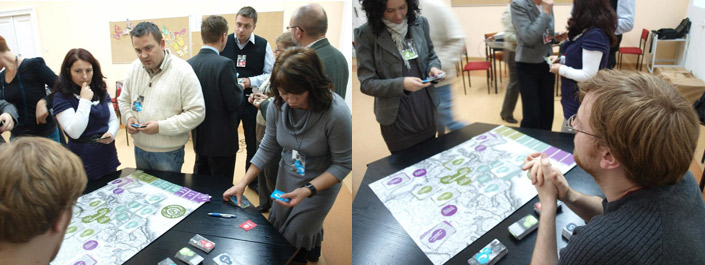
Young Culture
Science in action
The unusual 18th-century history of entrepreneurship of peasants from Lesser Poland’s Andrychów. We stumbled upon it while looking for in idea for a cultural event called “Museum Hunting” (“Muzeobranie”). This cultural event for a wide audience was organised within the scope of our long-term programme of cooperation with selected museums.
As a result of cooperation between Lesser Poland’s Institute of Culture and Andrychów Fans Society in the years 2007-2009 an educational programme and a new formula of visiting The Regional Chamber of Andrychów in Andrychów were created. It was based on the history of serfs who were creating trade partnerships and organising linen cloth trade on a European scale even before the industrial revolution.
It is also worth mentioning about our earlier experiences with publishing a family board game “St. Kinga’s Ring” inspired by the history of medieval Lesser Poland.
What is the goal of this initiative?
Initially, in 2007, the goals were regional education and popularising history and cultural heritage of Lesser Poland in an attractive way, in this case history of Andrychów. In 2009, a prototype of “Peasant’s School of Business” was created (under the auspices of the “European Year of Creativity and Innovation 2009”) and that is when new goals, possibilities and audiences appeared, also outside Lesser Poland. The game turned out to be useful in schools, academia and in business as a tool for conducting lessons, workshops and training courses related to e.g. finance, management and group processes.
Publishing a pilot edition of the game, in September 2010 within the scope of the “Patriotism of Tomorrow” programme executed together with the Polish History Museum, allowed us to use this interdisciplinary tool in economic and historical education and to restore memories of local histories and traditions, because history of peasant entrepreneurship was not particularly well-known in Andrychów before 2007.
Apart from these direct pursues of publishing the game and restoring local memories, an important educational goal is to develop entrepreneurship competence in young people, creating a positive image of an entrepreneur and promoting an enterprising attitude. We wanted to promote a positive image of an entrepreneur as a man who is not only resourceful but also trustworthy and cooperative.
The final goal involves appreciation of local history and cultural heritage as an important, although sometimes underestimated, capital. In the research context, we also care for searching and discovering the potential of local history, using it for educational purposes, social-cultural animations and creating an image for a given place.

Who is the project intended for?
In the years 2007-2009, “Peasant’s School of Business”, as a part of a bigger museum programme – “Museum Hunting”, was intended for schools in Lesser Poland and for tourists interested in visiting Lesser Poland’s museums.
In 2010, when a separate project of publishing an economic game was created, the intended audience were gymnasium and high school students as well as teachers, especially basics of entrepreneurship, social science and history teachers.
The game is also intended for people educating adults as a useful tool for conducting workshops or training courses in both academia and in the world of business. This tool may be used by museum workers who conduct classes in cultural and historical education. It is also worth stressing that “Peasant’s School of Business” allows conducting educational actions also outside museums.
What does “Peasant’s School of Business” consist in?
It is a game for 12 to 30 players who play the roles of bakers, weavers and merchants. They make breads, cloths or carriages which they can trade with other players on a fair in Andrychów. The players can also make money by organising trading expeditions to cities visible on the board (a historical map of Europe). The players can freely walk around the room, exchange wares and mountain zlotys, bargain and plan trading expeditions.
The game’s mechanics teach players to take initiative, persuade them to cooperate and after the game is over they allow to easily explain such economic phenomena as supply, demand, partnership, business cluster and financial categories: income, expense or profit. What is important, to understand the rules of the game on does not have to be a mathematician or an economist.
Thanks to a relatively large number of players – simultaneously working entrepreneurs – the game has a nature of a market simulation which takes place in real life. Thanks to the nature of the game which resembles a fair, the simplest application of the game can be integrating a group.
Each game is moderated by a teacher, an animator or a trainer who can create their own variants of the game for their educational needs. It takes only 45 minutes to conduct and sum up the basic version of the game.
Why did you decide on the form of a game? What is so special about this form of cultural education?
A game is an exceptionally attractive educational tool, especially a game adjusted for a group. Thanks to its formula – learning by doing – it can, just like “Peasant’s School of Business”, introduce important and difficult issues of e.g. economy. A group game can be like a simulator of social or market behaviour – cooperation and competition. It allows the participants to play roles and safely learn by interacting with others. It seems that it is easier to pass the knowledge by referring to players’ experiences from the game than relying only on handbook definitions. From the museum activity point of view, using the game allows to reach a wider audience and increase the range of museum education without confining it inside museums. Besides, the game is simply fun for both young people and adults.
What made you use the peasant traditions of entrepreneurship?
The peculiarity of Andrychów’s history which was brought to light thanks to the cooperation of Lesser Poland’s Institute of Culture and Andrychów Fans Society. The main characters of this history were 18th-century serfs:
-illiterates who created trade partnerships called “colegations” (kolegacje) and kept the accounts by themselves
- artisans whose so called drills competed on the European market of linen cloths
- merchants who organised trading expeditions to i.a. Barcelona, Moscow and even Stambul.
While trying to answer the question of how it was possible, we took many actions. The result was i.a. organising three editions of the “Museum Hunting. Weekend of Museum Discoveries” event (whose programme used themes of this local history), temporal exhibitions in the Regional Chamber, workshops on traditional crafts in Andrychów, a documentary about historic and modern entrepreneurship created by local youth and of course creating and publishing an economic game. The peculiar local history allowed to recall old traditions and on its basis contribute to creating a new image of the place. It also became an inspiration to creating an interdisciplinary education tool that popularises history also outside Lesser Poland.
What makes the game attractive? How does it differ from the popular board game “Eurobusiness”?
The only common element in both games are money. The difference is that in “Peasant’s School of Business” players do not use dollars but mountain zlotys. Moreover, a peasant businessmen have time cards at their disposal.
The attractiveness of “Peasant’s School of Business” is a result of using an extraordinary local history and ordinary in-game characters. The second aspect is an advantage particularly for adults who find it easier to play the role of a baker than some fantasy character as is the case in many other games. Earning money depends largely on the players’ initiative and is a source of satisfaction for the participants. The hubbub, exhortations and haggling make every game a small event.
Where can one play “Peasant’s School of Business”? Is it available on the commercial market?
We published a small pilot edition in September thanks to the support of Polish History Museum in the scope of the “Patriotism of Tomorrow” programme. According to the requirements of the programme, the game is of a non-commercial nature and was distributed free of charge among the participants of conferences and workshops related to education, history and cultural activity. We hope that next year we will manage to increase the edition and that it will be available in the whole country.
Do you know how the game was received? Does the idea arouse interest?
Yes, during testing and during exhibition games after publishing in September, we received an enthusiastic reception from players and future moderators (teachers, museum educators and academics). We also got an extensive and favourable review on the GamesFanatic.pl website
The game aroused interest also thanks to an interschool tournament “Andrychów Drill Maker Cup” organised by Andrychów Fan Society in 14 schools in Wadowice Powiat. 1 200 students played in the preliminaries and 112 of the most enterprising students of gymnasiums and high schools participated in the finals. The idea was picked up by Schools in Subcarpathian Voivodeship where a new interschool tournament of “Peasant’s School of Business” has begun. The finals will take place in January in Jan Zwierz School Complex in Ropczyce. There is a big chance that “Peasant’s School of Business” will appeal also to schools in other regions.
The game published by Lesser Poland’s Institute of Culture has also been noticed in the “National Leader of Innovation and Development – 2010” competition. Thanks to this idea we became winners on the regional level in the innovative organisation category.
The game concerns a specific town – Andrychów. Is this a one-time project or is it only the first one in a series of projects that promote similar, enterprising regions?
The several-years-long work in Andrychów has displayed the educational, marketing and animation potential of history. We would like to use these experiences for local development in other towns. However, it is a process that requires funding and several years of work and cooperation with a local partner well grounded in the community. But the effort put into working with cultural heritage pays off. The effect may be an educational product that serves not only promoting a town but also nationwide education about entrepreneurship and cooperation.
A second such regional product could be a game about the history of petroleum industry in Lesser Poland. It is related to Ignacy Łukasiewicz, an entrepreneur who constructed the first oil well in the world. History may be as valuable as petroleum. I hope that we will start making test bores soon...
Greta Gorgoń and Sebastian Wacięga from Lesser Poland’s Institute of Culture were interviewed by Agnieszka Gernand
Lesser Poland’s Institute of Culture
www.mik.krakow.pl
Check the archive

no 60 May 2012
theme of the issue:
CULTURE'S SOMETHING MORE...
< spis treści
Article
From the Editors
Presentation
A Peasant’s School of Business
Career in Culture
Jobs in culture, what does it mean? - interview with Liz Hill, the president of Arts Intelligence - Agnieszka Furmańczyk
Culture Industries
New Technologies Segment - interview with Marcin Misztal, Chief Executive Officer of Tromedia - Maciej Mazerant
Young Culture
Science in action - interview with Greta Gorgoń and Sebastian Wacięga from Lesser Poland’s Institute of Culture - Agnieszka Gernand





